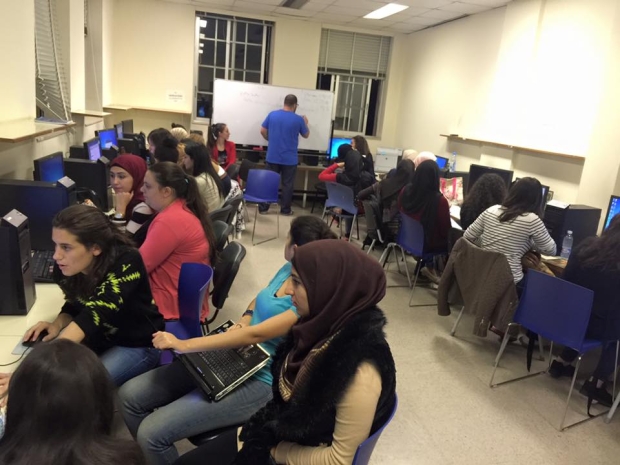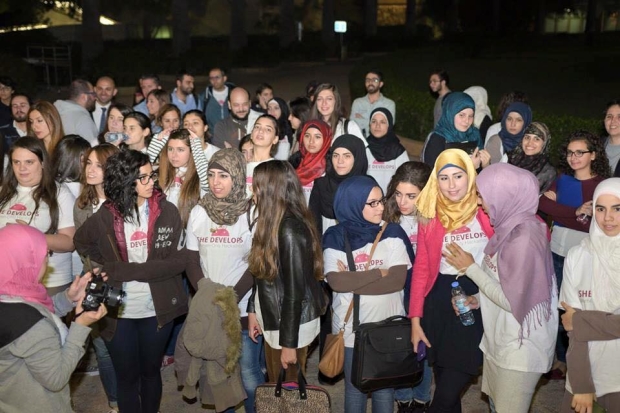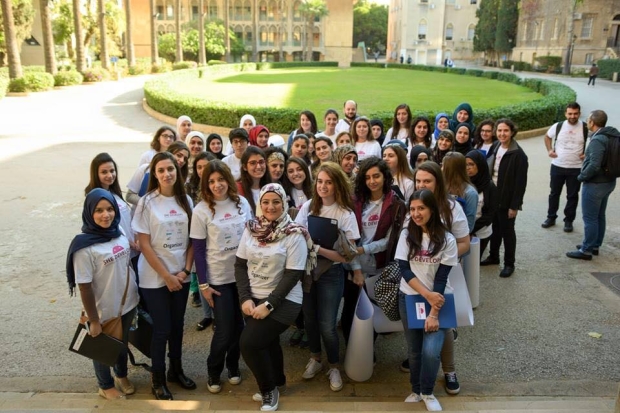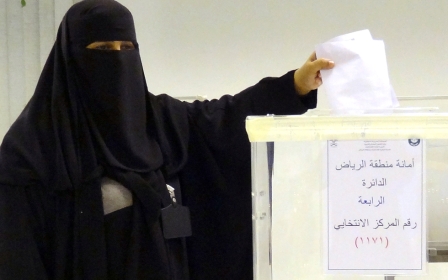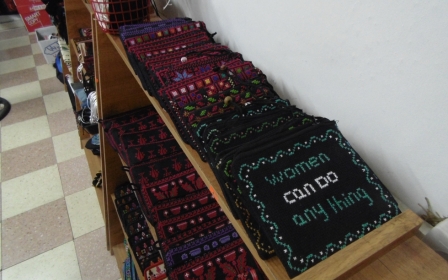Women in Lebanon show computer coding is not just for the boys
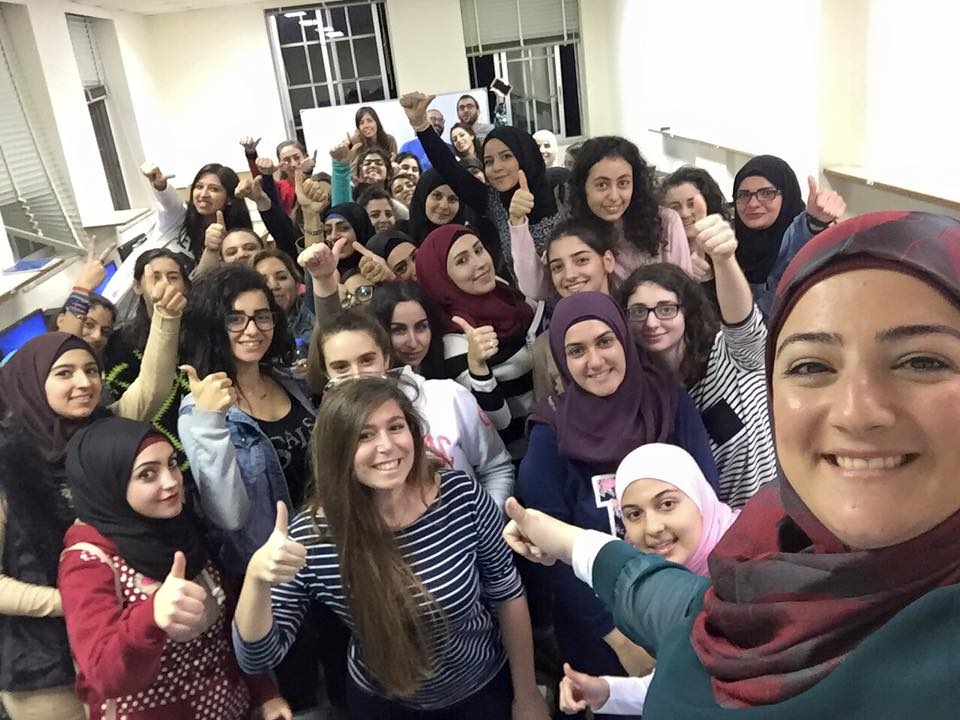
On 21 November, in Bliss Hall at the American University of Beirut (AUB), a group of nearly 50 young computer programmers gathered at 8am for a hackathon.
After coffee and a quick croissant, they were divided into 10 teams, and spent the next 10 hours developing Android apps to solve a social problem of their choice, in line with the UN’s Millennium Development Goals.
While 20 years ago, the term "hacking" might have connoted images of sinister dweebs clad in black, committing cyber crimes in a grimy basement, today "hack" has been incorporated into polite society; to hack something simply means to make it easier or more efficient.
Squeaky-clean companies like Facebook and Google have adopted some of their most successful innovations based on company hackathons, and listicles on how to hack your life/office/bathroom populate websites as family friendly as Buzzfeed and Mashable.
Hackathons and web development competitions aren’t anything new in the Middle East, either. In Lebanon, as the country’s digital literacy grows, developers of all stripes are increasingly in demand, by both established companies making the transition online, as well as startups fuelled by the growing resources and investment capital available in the country.
But the AUB hackathon had a special distinction among these events: all the developers there were women. It was the first all-women hackathon in Lebanon.
Lebanon: A specific need
Nisreen Deeb, a Lebanon ambassador for ArabWIC (Arab Women In Code) and one of the event’s organisers, still remembers her reaction walking into her first day as a computer science major at the Islamic University of Lebanon in 2008.
“I was like ‘Oh my god, where am I? Why are there no women here?’” she recalls, laughing. “I was the only woman out of my class of 30, and I graduated with the best GPA in the whole department. Every time I got better grades than the men I said to myself ‘Okay, we can do it, we just need more focus and self-confidence.’”
Many countries in the Middle East see ever-increasing numbers of women studying computer science at universities, says ArabWIC founder and NYU professor Sana Odeh, on the phone from her New York office. Citing a still-ongoing study, Odeh says “in many countries in the region, including Palestine, Saudi Arabia and the UAE, women make up more than 50 percent of students in computer science and engineering.”
In Lebanon, it’s a different story. “We don’t have data from all the universities in Lebanon yet, but the numbers we’re seeing are around 25 percent,” she reports - a far cry from the regional average. (Still, she notes, this 25 percent is higher than the average in the US.)
Why Lebanese women are less likely to study computer science than their regional counterparts is a mystery; the hurdles faced by women in Lebanon with an interest in computer science are similar to those faced by women all over the Middle East (and indeed, the world).
“Most companies in Lebanon aren’t willing to hire women. They think she’ll just get married and get pregnant,” Deeb laments. Further, “with jobs that require travel, they prefer to hire men. They’re used to the mindset that women can’t leave their houses.”
Girls interested in computer science face insidious resistance from a young age, sometimes within their own families, schools or universities. Hanya Kerdieh, a senior in computer science at Beirut’s American University of Science and Technology whose app The Notifier won first place at the hackathon, reports being discouraged by her family, who told her she wouldn’t be able to complete her chosen major.
Miriana Itani, a master’s student in computer science at the Islamic University of Beirut, recalls a professor at her undergraduate institution giving her poor grades on group projects, assuming her male partner was doing her work for her. She kept at it, though, and with the support of her parents is now in a master’s program where her professors are “really encouraging”.
But it’s not just up to society in general to change: “Women are also shy to apply for jobs they don’t think they’ll get,” Nisreen Deeb says. “We need to be brave, to improve ourselves, then society will see us, and we’ll oblige them to notice our work.”
Surpassing expectations
Enter She Develops, the hackathon for women - organised by ArabWIC and IEEE Women in Engineering, with sponsorship from AUB’s computer science and engineering departments, Google Developers Launchpad, local mobile app developer FOO, and local entrepreneurship platforms Wamda and Arabnet.
It’s an impressive list of sponsors for an event that was put together in about a month. But, then again, according to Deeb and her fellow organiser Mona Itani, vice-chairman of IEEE and a Lebanon ambassador for ArabWIC, everything about the event exceeded their expectations rather dramatically.
“When we began planning it,” says Itani, a lecturer at AUB’s engineering school, “we thought it would be great to have four teams competing. Bit by bit it grew until we had over 50 participants, 10 teams, and began turning down men who were eager to get involved.” (Future hackathons will welcome male participants, but will keep women in the roles of team leaders.)
The week prior to the Saturday event, professional developers from FOO hosted two basic coding workshops on the AUB campus (so as to give women with little coding experience a chance to get caught up), as well as business ideation sessions. Then, at the event itself, each team was assigned a professional developer as a mentor, to support them through the process.
At the outset, Deeb was apprehensive about whether the event would be successful. She warned the judges (five Lebanese entrepreneurs, investors and professionals - three of whom were women) not to expect much, and thought “definitely, definitely some people would give up”.
But despite some tears and frustrating moments, and with the help of their mentors and a crucial 3pm delivery of Red Bull, each team completed their Android app by 6pm.
At the awards ceremony that followed, The Notifier, an emergency notification app that sends an SMS to pre-selected contacts when the phone is shaken, was awarded first prize - including internships with FOO, office hours and consultations at Wamda, and $500 in matched funding on the Arab world’s own crowdfunding site Zoomaal (CEO and founder Abdallah Absi was one of the judges).
Coding++
With the massive growth of the IT sector worldwide (one 2012 report predicted 22 percent growth worldwide by 2020), coding is one of the most important skills university students in any department can learn. She Develops was an opportunity for women to learn the basics of programming, or develop their skills in a supervised environment.
But more than computer science skills, women reported having learned other skills from the event - skills necessary for getting jobs, not just doing them well. Miriana Itani, Hania Kerdieh and other participants Alaa Almutawa and Wedad Ambtawi all reported having learned leadership and communication skills.
“I know if I go into this field,” said Almutawa, a senior in computer science at AUB, “it’s not just about programming, it’s about how to listen to people and implement what they say.”
“I know my coding skills,” Itani chimed in, “but I learned about everything else. I discovered that I could come up with ideas, and I could present them to an audience.”
Itani went on, speaking excitedly: “I also learned that we need more hackathons. Companies are hesitant to hire women, like Nisreen says. "FOO was impressed; everyone was impressed by what we did. If companies see more of that, if they see what we’re capable of, they’ll be more willing to hire women.”
New MEE newsletter: Jerusalem Dispatch
Sign up to get the latest insights and analysis on Israel-Palestine, alongside Turkey Unpacked and other MEE newsletters
Middle East Eye delivers independent and unrivalled coverage and analysis of the Middle East, North Africa and beyond. To learn more about republishing this content and the associated fees, please fill out this form. More about MEE can be found here.


